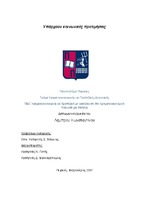Υπάρχουν κοινωνικές προτιμήσεις

View/
Keywords
Κοινωνική επιλογή ; Θεώρημα του Arrow ; Φιλελεύθερο παράδοξο ; Συστήματα ψηφοφορίας ; Θεώρημα του May ; Ψηφοφορία CopelandAbstract
The aim of this work is to present comprehensibly and analytically the corollary of one of the most fundamental theorems of the contemporary economics, the Arrow‘s Ηmpossibility Σheorem (1963). The problem of the articulation νf the individual preferences has developed in the Σheorem of Social Choice and in other similar problems such as the Liberal Paradox, so the presentation of their rudimentary differences is required. The Social Choice combines elements of the economic welfare and the voting theory. It is methodologically individualistic, in the sense that it sums the preferences and the behaviors of the individual members of the society. Using the elements of the typical rationality generally, the analysis proceeds from a series of ostensibly logical axioms of the social choice to the formation of a collective function of the social choice. The results revealed the logical incompatibility of the several axioms, such as the Arrow‘s Theorem, presenting a problem of gathering and suggesting reformulation or theoretical screening in the conclusion of some axioms. In the first chapter we will deal with the Arrow‘s Theorem, we will define the axioms of this theorem and we will study each one of them separately. In the second chapter we will deal with the Liberal Paradox, also Sen Paradox, which is a simplification of Arrow‘s Theorem. In the third chapter there will be a presentation of the voting systems, but we will focus on specific voting methods, such as the Majority rule, the Borda and the Copeland method. In this chapter we will thoroughly present each voting method, we will analyze their technical features, we will present the May Theorem and which voting methods correspond to it. The forth chapter includes a practice on the corporate governing and indicates how these properties are implemented in such ac on text.


